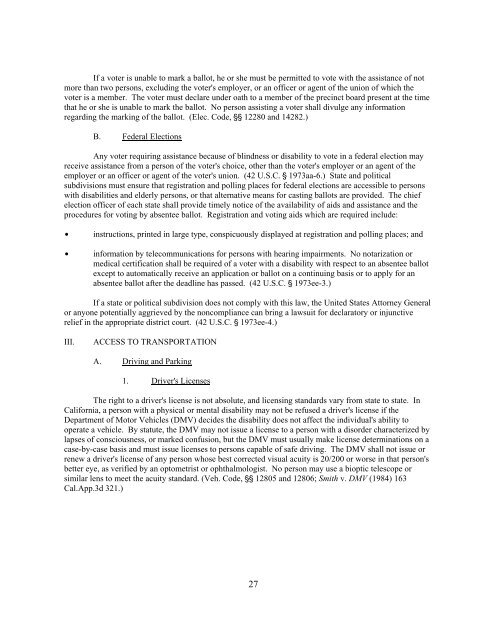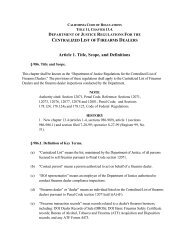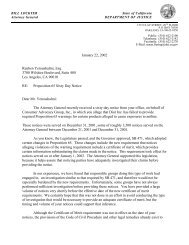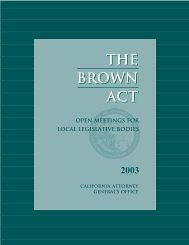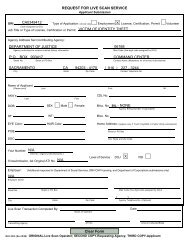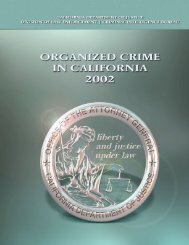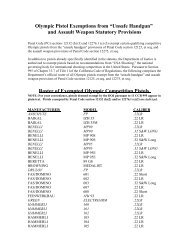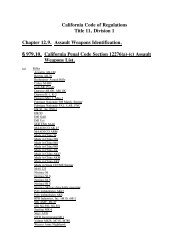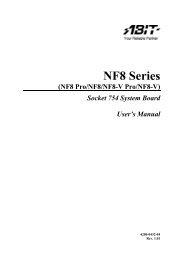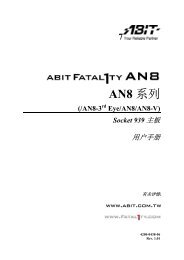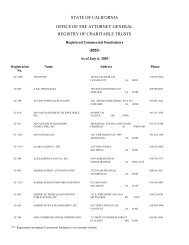Legal Rights of Persons With Disabilities - Ossh.com
Legal Rights of Persons With Disabilities - Ossh.com
Legal Rights of Persons With Disabilities - Ossh.com
Create successful ePaper yourself
Turn your PDF publications into a flip-book with our unique Google optimized e-Paper software.
If a voter is unable to mark a ballot, he or she must be permitted to vote with the assistance <strong>of</strong> not<br />
more than two persons, excluding the voter's employer, or an <strong>of</strong>ficer or agent <strong>of</strong> the union <strong>of</strong> which the<br />
voter is a member. The voter must declare under oath to a member <strong>of</strong> the precinct board present at the time<br />
that he or she is unable to mark the ballot. No person assisting a voter shall divulge any information<br />
regarding the marking <strong>of</strong> the ballot. (Elec. Code, '' 12280 and 14282.)<br />
B. Federal Elections<br />
Any voter requiring assistance because <strong>of</strong> blindness or disability to vote in a federal election may<br />
receive assistance from a person <strong>of</strong> the voter's choice, other than the voter's employer or an agent <strong>of</strong> the<br />
employer or an <strong>of</strong>ficer or agent <strong>of</strong> the voter's union. (42 U.S.C. ' 1973aa-6.) State and political<br />
subdivisions must ensure that registration and polling places for federal elections are accessible to persons<br />
with disabilities and elderly persons, or that alternative means for casting ballots are provided. The chief<br />
election <strong>of</strong>ficer <strong>of</strong> each state shall provide timely notice <strong>of</strong> the availability <strong>of</strong> aids and assistance and the<br />
procedures for voting by absentee ballot. Registration and voting aids which are required include:<br />
$ instructions, printed in large type, conspicuously displayed at registration and polling places; and<br />
$ information by tele<strong>com</strong>munications for persons with hearing impairments. No notarization or<br />
medical certification shall be required <strong>of</strong> a voter with a disability with respect to an absentee ballot<br />
except to automatically receive an application or ballot on a continuing basis or to apply for an<br />
absentee ballot after the deadline has passed. (42 U.S.C. ' 1973ee-3.)<br />
If a state or political subdivision does not <strong>com</strong>ply with this law, the United States Attorney General<br />
or anyone potentially aggrieved by the non<strong>com</strong>pliance can bring a lawsuit for declaratory or injunctive<br />
relief in the appropriate district court. (42 U.S.C. ' 1973ee-4.)<br />
III.<br />
ACCESS TO TRANSPORTATION<br />
A. Driving and Parking<br />
1. Driver's Licenses<br />
The right to a driver's license is not absolute, and licensing standards vary from state to state. In<br />
California, a person with a physical or mental disability may not be refused a driver's license if the<br />
Department <strong>of</strong> Motor Vehicles (DMV) decides the disability does not affect the individual's ability to<br />
operate a vehicle. By statute, the DMV may not issue a license to a person with a disorder characterized by<br />
lapses <strong>of</strong> consciousness, or marked confusion, but the DMV must usually make license determinations on a<br />
case-by-case basis and must issue licenses to persons capable <strong>of</strong> safe driving. The DMV shall not issue or<br />
renew a driver's license <strong>of</strong> any person whose best corrected visual acuity is 20/200 or worse in that person's<br />
better eye, as verified by an optometrist or ophthalmologist. No person may use a bioptic telescope or<br />
similar lens to meet the acuity standard. (Veh. Code, '' 12805 and 12806; Smith v. DMV (1984) 163<br />
Cal.App.3d 321.)<br />
27


